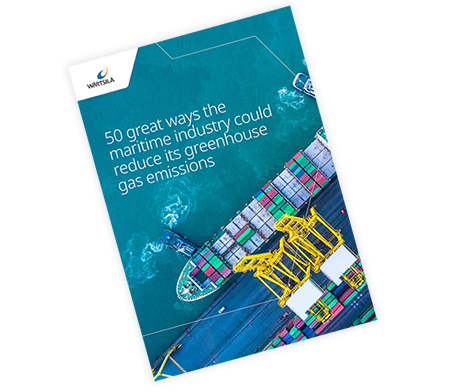
Wärtsilä Fit4Fuels – Future fuels conversion for 2-stroke marine engines
Future-proof your engine with retrofit
A Wärtsilä innovation, Fit4Fuels is a retrofit technology platform to convert 2-stroke diesel engines to run on future fuels. Our ground-breaking hybrid combustion concept maintains engine power density and eliminates fuel slip. Extends an average ship’s CII compliance by 3-5 years. Offers breathing space until uncertainties in fuel availability and cost resolve. When it is time to convert, the engine efficiency carries over. Making new fuels more economic. All of which makes this the ideal first step in your decarbonization journey.
Benefits
- Reduced emissions and GHG footprint
- Long-term CII compliance and extended operational lifetime
- Fuel flexibility futureproofing the investment
- Fast and straightforward retrofitting concept
- Short pay-back time and access to sustainable financing
Reduced CO2 footprint with negligible methane slip when switching to LNG
Discover the details of Fit4Fuels
Fit4Fuel – the 2-Stroke future fuels conversion platform deploys innovative fuel injection technology. Thanks to Fit4Fuel, the environmental advantages from using LNG and future fuels could be within your reach. Download this white paper to learn how Fit4Fuel could simplify integration and save you capital and onboard footprint!

Designed for ease and flexibility
Our patented technology features a pioneering cryogenic fuel supply system and flexible combustion process that is efficient, easy to install, and upgradeable. Features include:
- Streamlined retrofit process enables conversion within a scheduled dry-docking
- Combustion concept minimises fuel slip by optimising process for fuel type and quality
- Low-complexity cryogenic fuel supply with minimal energy demand
- Modular design offers fuel flexibility adaptable to customer’s decarbonisation strategy
- Complemented by Wärtsilä Fuel Gas Supply Systems for turnkey conversion solution
Improve your business performance while reducing emissions
Based on current fuel prices, converting two-stroke engines to future fuels brings substantial economic benefits. For typical larger vessels (for example a 10,000–13,000 TEU container ship) consuming 30,000 tons of liquid fuel per year with a 10-year remaining lifetime, the conversion is a sound investment. With less than four years’ payback time the conversion enables CO2 reduction of 21,000 tons annually.
Fuel conversion will reduce emissions
Converting your vessel’s engines to run on sustainable fuels is a great way to reduce your emissions. You will find 49 more ways in a fascinating eBook “50 great ways the maritime industry could cut its greenhouse gas emissions”. Learn more:
A trusted partner
Choosing a fleet decarbonisation strategy depends on several factors including vessel characteristics, operating profile, area of operation and fuel availability. Wärtsilä’s unparalleled expertise across technologies and wide project experience means we can help ship operators understand the business case behind decarbonisation choices – and support implementation every step of the way, from planning to in-field service.
Fuel flexibility means technology investments made today will not become obsolete. The benefits, both economic and environmental, are massive.







